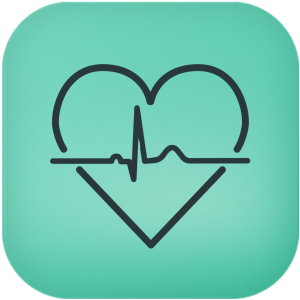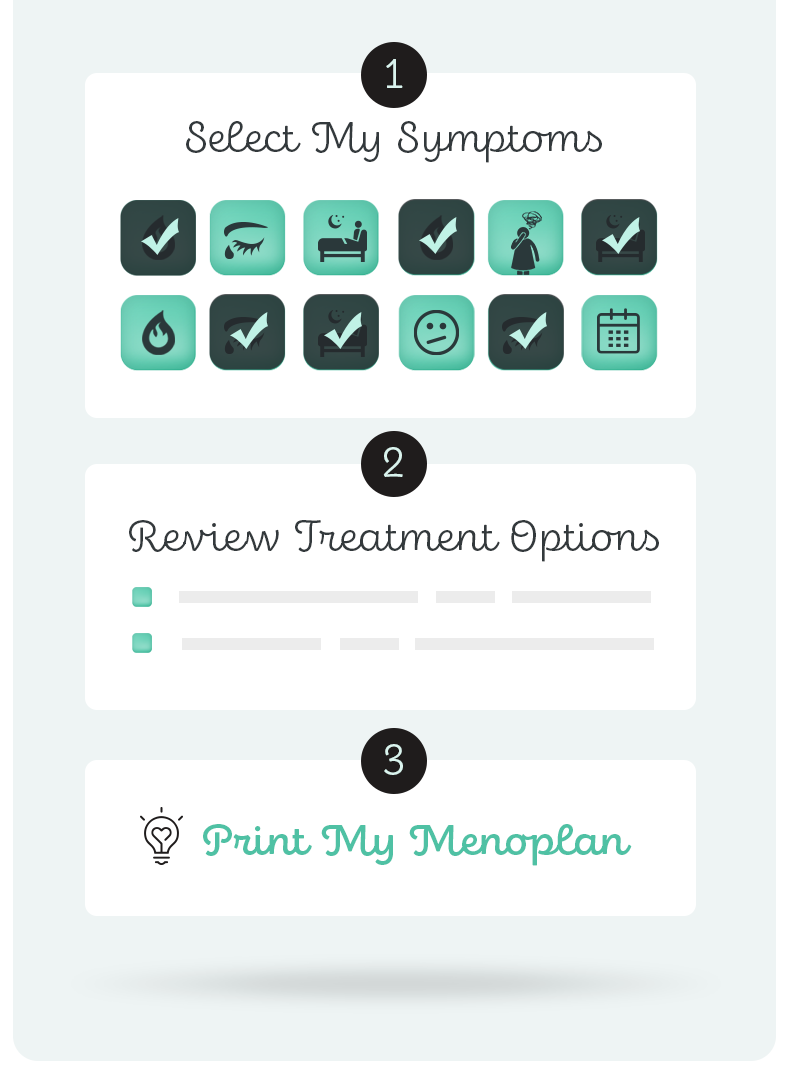Symptoms
PALPITATIONS
What is it? Most of the time we are unaware of our heartbeat. Sometimes during exercise or a sudden fright we may notice our heart pounding, and that’s normal. But sometimes we notice our heartbeat without a clear explanation. This may be a feeling in our chest, throat, or neck. It may feel like a skipped, missed, or irregular heartbeat, our heart pounding or thumping, or a fluttering sensation. These feelings are called palpitations. Although a lot of research has been done about palpitations, very little research has been done on palpitations during the menopause transition.
Palpitations are common. They occur more in women than men, and they increase as we age. They are reported in 4-40% of premenopausal women, 20-40% of perimenopausal women, and 16-54% of postmenopausal women. Overall, about 25-48% of peri and early postmenopausal women report distress from palpitations. They are more common in women who had a menopause induced by surgery, than in premenopausal women or women who have a natural menopause.
The likelihood that a woman has distress from palpitations increases with higher body mass index, insomnia symptoms, depressive symptoms, and perceived stress. The likelihood of distress from palpitations also increases as women report poorer menopause related quality of life.
What is Happening to my Body?
The sensation of palpitations may be felt along with other symptoms, for example when you have a hot flash, or just on its own. There are many changes in how the heart is beating that can cause this sensation. Usually, these changes happen for a short period of time and then the heart returns to beating normally.
- The heart may beat harder than normal during a hot flash. This is because as our blood vessels dilate to get rid of heat our blood pressure falls a little. Our heart beats harder to raise our blood pressure. This may be felt as a pounding heartbeat.
- The heart may have short periods where it beats faster or slower than normal.
- The heart may have “early” or “skipped” beats.
Many things can trigger palpitations. Too much stress, caffeine, chocolate, nicotine, and alcohol can all cause palpitations. Illegal drugs including cocaine and amphetamines can also cause them. There are some prescription drugs and over-the-counter drugs (for example cough and cold medicines) that may increase them. They may happen during panic attacks, or if you have a fever.
What to Expect
If you are concerned about palpitations, talk with your health care provider about them. Your health care provider will listen and consider your age, your risk factors for heart disease, and any chronic conditions you may have. There are things your health care provider may want to know including:
Have you checked your pulse when you have palpitations? Does your pulse feel fast, slow, irregular, or regular? Does it feel like you skip beats? Note that some some fitness trackers and smart watches record pulse and arrhythmic beats.
Do you feel faint, dizzy, out of breath, or have aching or pain in your chest, neck, back or arm when you have palpitations?
Do they have a trigger? What are you doing or what else is happening when you have palpitations?
There are many different approaches your health care provider may take to evaluating your palpitations. This may vary from watchful waiting to tests to see what is causing these sensations. Potential tests include:
- An electrocardiogram (EKG): This is a recording of the electrical activity of your heart at rest. It evaluates your heart activity over a short period of time.
- A Holter Monitor: This is a device you wear on your chest for 24-48 hours to record a continuous EKG. There is usually a button you can press if you feel palpitations. Depending on how often you have them, this may or may not catch your palpitations.
- Echocardiogram – an ultrasound of the heart to evaluate the heart muscle and valves, and to see how the heart is pumping.
- Blood tests to evaluate your cardiac risk including blood lipids and blood sugar.
Treatments that are inappropriate or have not been studied for this symptom are not listed.
Please scroll beyond “References” to access more resources if you are browsing on mobile or tablet
https://www.mayoclinic.org/diseases-conditions/heart-arrhythmia/symptoms-causes/syc-20350668
https://www.health.harvard.edu/heart-disease/skipping-a-beat–the-surprise-of-palpitations
Carpenter JS, Tisdale JE, Chen CX, Kovacs R, Larson JC, Guthrie KA, Ensrud KE, Newton KM, LaCroix AZ. A Menopause Strategies-Finding Lasting Answers for Symptoms and Health (MsFLASH) Investigation of Self-Reported Menopausal Palpitation Distress. J Womens Health (Larchmt). 2021 Apr;30(4):533-538. doi: 10.1089/jwh.2020.8586. Epub 2020 Nov 20. PMID: 33217253; PMCID: PMC8064942.
Sheng Y, Carpenter JS, Elomba CD, Alwine JS, Yue M, Pike CA, Chen CX, Tisdale JE. Review of menopausal palpitations measures. Womens Midlife Health. 2021 May 31;7(1):5. doi: 10.1186/s40695-021-00063-6. PMID: 34059122; PMCID: PMC8167994.
Sheng Y, Carpenter JS, Elomba CD, Alwine JS, Yue M, Chen CX, Tisdale JE. Effect of menopausal symptom treatment options on palpitations: a systematic review. Climacteric. 2021 Aug 4:1-13. doi: 10.1080/13697137.2021.1948006. Epub ahead of print. PMID: 34346265.



